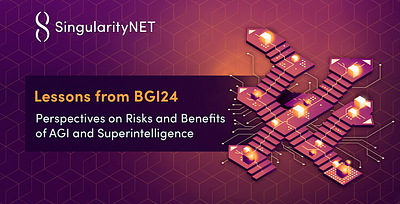
Dear Singularitarians,
We as a humanity are inching away to a new technological revolution, one centered around Artificial General Intelligence (AGI) and its colossal potential to change every aspect of our lives.
At the recent Beneficial AGI Summit & Unconference 2024 (BGI24), a panel of experts from various fields came together to explore this potential and paint a vivid picture of the different perspectives on the benefits and risks that next-generation AI and AGI promises to bring to our world.
Moderated by Haley Lowy of SingularityNET, the discussion featured insights from:
· Elizabeth Shaw, Founder, 1000 Black Voices
· Gregory Stock, CEO, and Professor, Icahn School of Medicine, Socratic Sciences
· Jay Friedenberg, Psychology Professor, Manhattan College
· José Luis Cordeiro, Vice Chair of Humanity+ & Director, The Millennium Project
· Roman Yampolskiy, Associate Professor, University of Louisville
The panelists, each with a unique background and perspective, explored the potential benefits and risks associated with AGI, the ethical implications, and the steps we can take now to ensure its development benefits humanity.
The panel served as a microcosm of the broader discourse on AGI, presenting a tapestry of viewpoints that ranged from enthusiastic endorsements of its possibilities to cautious analyses of its risks and the challenges ahead.
Today, we want to share insights from this panel discussion, so we can reflect on these viewpoints together and help bring you into the ongoing discourse on Beneficial Artificial General Intelligence (BGI).
To watch the full panel titled Perspective on Risks and Benefits of AGI and Superintelligence, please navigate to the Beneficial AGI Summit 2024 livestream.
www.youtube.com
The conversation likened the emergence of AGI to a moment in evolutionary history unmatched in recent memory. Gregory Stock compared the emergence of AGI to a significant evolutionary event, suggesting that humanitys control over AGIs long-term development is limited. He also emphasized the importance of being responsive to emerging challenges rather than trying to anticipate and prevent all potential risks.
The panelists highlighted AGIs capacity to solve intractable problems, enhance our understanding of the universe, and significantly improve the quality of human life.
However, this optimistic view was balanced with cautionary tales of potential risks, including existential threats and the displacement of human workers, that underscore the need for careful management of AGIs development.
Roman Yampolskiy raised his concerns about the inherent risks of developing AGI that we cannot control or predict, questioning the wisdom of pursuing such powerful technology without guaranteed safety measures. He challenged the community to prove the possibility of safe AGI before even thinking about proceeding further.
The panelists also agreed we require the creation of ethical frameworks and regulatory bodies to guide the development and implementation of AGI technologies.
These frameworks would not only aim to prevent misuse but also ensure that the benefits of AGI are distributed equitably across society.
Jay Friedenberg suggested using AGI to better understand and develop ethical frameworks, highlighting the importance of aligning machine intelligence with human values. He advocated for education to foster critical thinking and address the evergrowing problem of misinformation, ultimately emphasizing the role of human ethics in guiding the development of an AGI.
Furthermore, the conversation brought to light cultural differences in the perception of AI and AGI, noting how Eastern and Western perspectives might influence the global approach to these technologies.
José Luis Cordeiro, in his own right, highlighted the historical significance of AGI, advocating for more competition and innovation in the field. He stressed the positive aspects of AGI, referencing cultural differences that shape our perception of AI and calling for a global perspective in its development.
The experts unanimously agreed on the critical role of education in preparing society for the changes AGI will bring.
Public engagement and education can demystify AGI, reduce unfounded fears, and foster a more informed discussion about its (and our) future.
Elizabeth Shaw emphasized the necessity of kindness, empathy, and inclusivity in the development of AGI. She voiced concerns about the potential for AGI to exacerbate existing inequalities and stressed the importance of education and engagement to ensure that AGIs benefits are accessible to all.
The essence of this panel, and the contributions of our five panelists, is meant to represent a broad spectrum of thought on AGI ranging from optimistic visions of its potential to critical examinations of its challenges.
But its you, your voice, and your participation that will ultimately help us guide the course of development of Beneficial AGI.
By allowing experts and thought leaders to come together and help bring the awareness and understanding we all need, we can empower you, the individual, to contribute to the conversation about AGIs role in society.
As we move forward on this journey that is set to decide the future of humanity, lets do it with an awareness of the potential benefits and risks that AGI might bring, and focus our efforts on shaping it into a technology that will be beneficial to all sentient beings.
SingularityNET is a decentralized AI Platform and Marketplace for Artificial Intelligence (AI) services. Our mission is the creation of a decentralized, democratic, inclusive, and beneficial Artificial General Intelligence (AGI), democratizing access to AI and AGI technologies through: